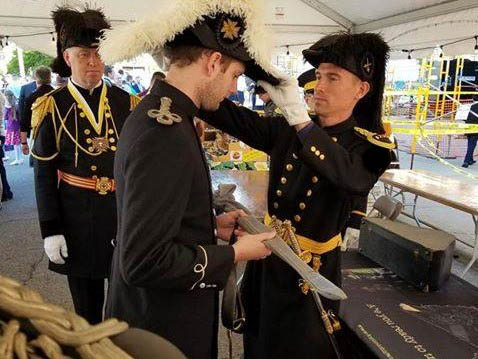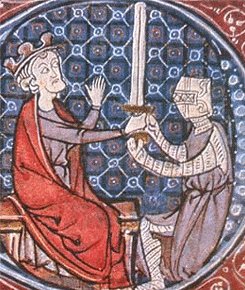What does it take to join the Knights of St. John? I can recall my own entry into our holy and noble order. It was a summer night, sitting by a campfire with a mentor and friend. I was a young man struggling to find a place in my church to rely on other men, to be sharpened by like-minded individuals. Knowing nothing of the Knights of St. John. As I sought the counsel of my friend, he suggested I join the Knights of St. John. The rest, as they say, is history.
I filled out the application and was soon offered the first degree in front of a group of men that were strangers. Today, almost a decade later – those strange men are friends, nay, they are brothers. My application was approved based on the testimony of my friend to his peers. I was, assessed by this group of men to be of a certain level of virtue. I continue to grow in my faith alongside these men, learning the ways of sacred knighthood. What it means to stand in the presence of the King as guard and defender.
How are we assessing ourselves though in the light of Christ? While we don the helmet of salvation and draw our swords as knights to defend the Word, in essence, we are all still squires on a life-long pilgrimage.
The Roman rhetorician Quintilian once wrote:
Let him that is skilled in teaching ascertain first of all, when a boy is entrusted to him, his ability and disposition.
As we see it, those that seek us out, or are sought out by us, are not boys, but men. And they come to us with a wide range of dispositions. We are given the chance to get to know them, if only briefly before installing them into a fraternity of faith, hope, and charity. But it is here we must pause. The intentions of bringing men into our organization must have a two-fold effect. We cannot selfishly think of ourselves or the order. That is only the first portion of the equation of strength.
Yes, our order relies on members, but just having the numbers does not satisfy the mission that we have set out to achieve. We may look to these men as needing us, to make them stronger Catholics, better men, and humble servants. But in reality, the opposite is true. Reaching into the heart of Sacred Scripture, we can take one phrase of how we must approach these men, new squires willing to don the uniform and join our ranks.
You have been told, O mortal, what is good, and what the Lord requires of you: Only to do justice and to love goodness, and to walk humbly with your God. –Micah 6:6-8.
With an increased level of humility, we have to do what is right by our order and walk humbly with these men, just as we would walk humbly with our God. The goal of the knight is to be Christ-like, for just like Christ we are all baptized as priest, prophet, and king. Although, as men, we are all those with lower case letters. Christ himself was the object of humilty.
How is it then, that we can continue on this path of assessing ourselves as squires, attempting to gain a level of humility, allowing ourselves to grow stronger in the face of our brothers, while at the same time strengthening our order?
We must value the time, talent, and treasure of even our newest knights, for we know not their total disposition that they come to us. We must drop the ugliest words that ever are formed into one sentence, “We have always done it that way.”
When we assist a new knight in donning his uniform for the first time, or when he is installed into the Order of the Chevaliers, there is a chance for us to view this knight as a mirror image of ourselves.
What is a Knight anyways?
It isn’t hard when we close our eyes and envision a knight to fall back on the fairy tales that we grew up with. King Arthur and the Knights of the Round Table, Prince Charming saving the damsel in distress. The knights of the crusades, defending Christianity and the Holy Land from nefarious forces. How can we tell what is real and what is a mere legend? What are we doing as knights to ensure that we are not just playing dress-up with fancy uniforms and swords, patting ourselves on the back, and pretending we have a so-called “code” that we live by?
When we help a new brother knight don his uniform for the first time, what are we expecting of him to do now that he has joined our ranks? Do we have aspirations for him? More importantly, does he have aspirations for himself. Are we able to sharpen him, honing him with the skills necessary to embrace the virtues of our Catholic faith and use them as a servant warrior of Christ in his community and parish; and an exemplification of what it means to be a knight?
Do we look at a young knight and see ourselves, but for the wrong reasons? Do we see someone that we can mold and manipulate so that we can stand in the rank and file and let him take over the reins? When we should be looking at this young knight and wondering, how can he sharpen me into being a better man, a better knight?
As we look to swell our ranks with men willing to uphold the tenants of our faith and our order, we must look around our church for those men that are going to challenge us, and set a precedence for us to be better men, better knights, and better Catholics.



Recent Comments